Troy
 for graphic violence and some sexuality/nudity.
for graphic violence and some sexuality/nudity.
| Moral Rating: | Very Offensive |
| Moviemaking Quality: |
|
| Primary Audience: | Adults |
| Genre: | War Action Adventure |
| Length: | 2 hr. 43 min. |
| Year of Release: | 2004 |
| USA Release: |
May 14, 2004 (wide) |
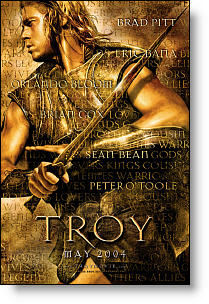
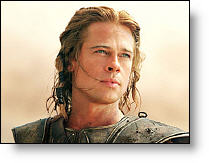
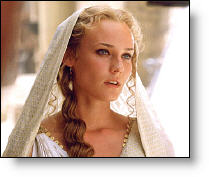
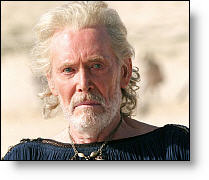
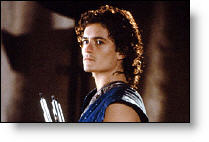
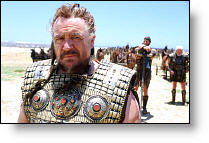
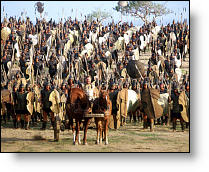
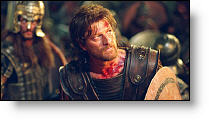
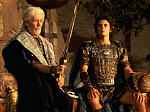
An adaptation of Greek Homer’s epic poem the Iliad about the Trojan War
Sin and the Fall of man
Greed
Revenge
Honor
War in the Bible
What is the Biblical perspective on war? Answer
SEXUAL LUST—What does the Bible say about it? Answer

Learn how to make your love the best it can be. Discover biblical answers to questions about sex, marriage, sexual addictions, and more.
| Featuring |
|---|
|
Brad Pitt … Achilles Eric Bana … Hector Orlando Bloom … Paris Diane Kruger … Helen Peter O'Toole … Priam Brian Cox … Agamemnon Brendan Gleeson … Menelaus Garrett Hedlund … Patroclus Sean Bean … Odysseus Julie Christie … Thetis Rose Byrne … Briseis See all » |
| Director |
| Wolfgang Petersen — “The Perfect Storm,” “Air Force One,” “Outbreak,” “In the Line of Fire,” “Shattered,” “Enemy Mine,” “The NeverEnding Story” |
| Producer |
|
Wolfgang Petersen Diana Rathbun See all » |
| Distributor |
Here’s what the distributor says about their film: “From the director of The Perfect Storm… Throughout time, men have waged war. Some for power, some for glory, some for honor—and some for love. In ancient Greece, the passion of two of history’s most legendary lovers, Paris, Prince of Troy (Orlando Bloom) and Helen (Diane Kruger), Queen of Sparta, ignites a war that will devastate a civilization. When Paris steals Helen away from her husband, King Menelaus (Brendan Gleeson), it is an insult that cannot be suffered. Familial pride dictates that an affront to Menelaus is an affront to his brother Agamemnon (Brian Cox), powerful King of the Myceneans, who soon unites all the massive tribes of Greece to steal Helen back from Troy in defense of his brother’s honor.
In truth, Agamemnon’s pursuit of honor is corrupted by his overwhelming greed—he needs control of Troy to ensure the supremacy of his already vast empire. The walled city, under the leadership of King Prium (PETER O’TOOLE) and defended by mighty Prince Hector (Eric Bana), is a citadel that no army has been able to breach. One man alone stands as the key to victory or defeat over Troy—Achilles (Brad Pitt), believed to be the greatest warrior alive.
Arrogant, rebellious and seemingly invincible, Achilles has no allegiance to anyone or anything, save his own glory. It is his insatiable hunger for eternal renown that leads him to attack the gates of Troy under Agamemnon’s banner—but it will be love that ultimately decides his fate. Two worlds will go to war for honor and power. Thousands will fall in pursuit of glory. And for love, a nation will burn to the ground.”
Troy. A city. An empire. And now a summer blockbuster.
Homer’s “Iliad” has fascinated readers for a hundred generations, and is considered an indispensable part of a good Classical education. It was written about 800 BC, a mixture of fact and fiction concerning the siege and destruction of Troy 400 years earlier. Proverbs and catch phrases like “Achilles’ heel,” “The face that launched a thousand ships,” and “Beware of Greeks bearing gifts” are a permanent part of our culture.
In the 1950s, as a young gradeschooler, I owned an “Iliad for Boys and Girls,” a simplified and slightly sanitized translation that nevertheless contained: the adulterous relationship that sparked the conflict; descriptions of extreme violence; numerous references to the Greek gods interfering capriciously in human affairs; and several Greek-art-style illustrations of well-muscled men, graphically nude except for their armor, fighting to the death. I also remember a very graphic “comic book” version of the story.
It’s not realistic to expect a major movie studio to create a version of “Troy” that’s appropriate for family viewing. If this film would offend you or your children, then avoid it or see it without the kids. You could choose last year’s made-for-TV “Helen of Troy,” although you’ll still be hit with sex, nudity and some pagan supernaturalism which is surprisingly missing from this new version. There are also some fifty-year-old film versions. Or, you could just read the book, or even ignore the story altogether. I must say that, although there’s a great deal of problem material in this new version of “Troy,” the producers and director did show a certain amount of discretion in some areas.
PLOT: Although the various Greek city-states have long functioned as independent nations, King Agamemnon of Mycenae (Brian Cox) has now forcefully united most of them into a federation. Two roadblocks remain before he can fully consolidate his gains. One, the state of Thessaly remains to be subjugated. That’s accomplished by having Agamemnon’s champion Achilles (Brad Pitt) defeat Thessaly’s champion in single combat. Actually, Achilles is a wild duck who only fights whom he chooses, when he chooses. But this day, after being roused in midmorning from a bed he shares with two beautiful nude women, he decides to do Agamemnon’s bidding. With possibly-superhuman quickness and a characteristic jump-move that we’ll see several more times, he stabs his opponent once, and it’s all over.
The second roadblock is that Agamemnon’s brother, King Menelaus of Sparta (Brendan Gleeson), has broken ranks and made peace with the powerful city of Troy, located in what is now Turkey. But this “problem” solves itself when Prince Paris (Orlando Bloom), the son and emissary of King Priam of Troy (Peter O’Toole), not only seduces Menelaus’ wife Helen (Diane Kruger), but steals her away back to Troy. Agamemnon is only too happy to rouse an army from ALL the Greek city-states to defend his brother’s honor, and in the process subjugate or destroy a dangerous enemy empire.
Taking this story seriously (it’s historically accurate to some extent), it becomes an exercise in vicarious sadness over many people’s bad choices. Helen and Paris freely admit that what they’re doing is probably going to get a lot of people killed; but they do it anyway. When Paris’ elder brother Hector (Eric Bana) discovers that Helen has stowed away, he starts to turn the ship around, intending to restore her to her husband. But his concern for the safety of his kid brother makes him change his mind. When the ship arrives in Troy, King Priam too could choose to send Helen away, but he does not.
For a viewer desiring a pure hero to root for, there’s a scarcity of choices here. Hector and Priam are the “least bad,” but they have their faults. On the Greek side, the only fairly-notable character who seems to have positive qualities is Odysseus, also known as Ulysses (Sean Bean); and his screen time is limited.
The main-character setups take over half an hour. From there on, we know that thousands of innocent people are going to die, and that one side will lose the war. I assume almost everyone knows beforehand that Troy loses. The destruction of Troy by Greece, and the similar destruction of Carthage (in North Africa) by Rome a thousand years later, were pivotal events that helped to keep “world power” centered in Europe.
SEX AND NUDITY: Offensive, but could have been worse. There are several scenes of simulated or implied sex. But there’s no genital nudity in any of them, and no female breast nudity, except for some brief glimpses in the opening scene of Achilles with two women. The actors are nude in some of the other scenes of this type, but the camera angles and editing are discreet.
Paris’ and Helen’s behavior is shown in a bad light. We see that actions do have consequences. Far-reaching ones. Paris comes off as weak, despicable and cowardly, not someone to emulate. Aside from the archery, there’s no similarity between Paris and Bloom’s character in “Lord of the Rings.” Achilles and Trojan Princess Briseis (Rose Byrne) share a nonmarital sexual relationship. (By some accounts, the siege of Troy lasted ten years before the Greeks thought up the idea of the Horse, and Achilles was actually MARRIED to the Trojan princess. In this version, the siege seems to last only a few weeks, so any newly-formed relationships are necessarily brief and superficial.) Menelaus is briefly shown kissing a dancing girl at a party in his palace.
In non-sexual scenes, when the women ARE clothed, their attire is usually fairly modest but sometimes shows cleavage. Men’s upper-body muscles are featured prominently. The men wear miniskirt-length garments for battle, but there’s never any “flashing.” Even when a dead warrior’s body is dragged by his feet behind a chariot, his garment doesn’t ride up.
VIOLENCE: Overwhelming at times. The beach invasion scene is a little like a pre-industrial “Saving Private Ryan.” The other mass battle scenes, and the shots of a thousand ships on the ocean, obviously used computer-generated enhancement, but it’s almost impossible to tell where the filming stops and the enhancement begins. In the close-ups, there’s a great deal of “Braveheart” style stabbing and throat-slitting, with a lot of blood. The direction style of the action sequences is a mix of modern and old-fashioned techniques. Almost all movies of this type allow the main characters on both sides of the conflict to somehow “find” each other on battlefields after they each plow through and dispatch a host of nameless, ordinary soldiers.
In this film, not only do they find each other, but the secondary combatants sometimes take a breather, form a circle and watch their champions fight. The language and the acting style (during combat and elsewhere) is sometimes awkward and stilted, other times convincing.
OFFENSIVE LANGUAGE: Since both sides in this conflict are pagan societies, with no consciousness of the true God, there are no curses except those meant as a literal invoking of the vengeance of one or another member of the Greek pantheon of gods. There are a few other crude expressions: a couple of uses of “whore” and “bitch,” and some mild insults.
OTHER CONTENT: I was amazed that the script was carefully written to AVOID any explicit teaching that the Greek gods were “real.” There’s NO reference to Achilles’ mother Thetis dipping him as a baby in the river Styx, making him invulnerable except for the undipped heel by which she held him. That isn’t authentic Homer anyway, but a later legend. Homer said Achilles’ weakness was his pride. Later authors said it was his love for a Trojan princess. Still later authors (first century AD and onward) said it was the heel.
In this film version, we get all three; but the heel thing is kept vague. After fighting his way through nearly the entire film with nary a scratch on him, Achilles is finally shot in the heel and then several times in the chest. He pulls out the chest arrows, but not the one in his heel. Then, he slowly dies from an unspecified combination of those wounds. (By the way, there’s a strong possibility that the myth of Achilles’ heel is a pagan corruption of the prophecy of Jesus found in Genesis 3:15.)
Many people superstitiously refer to signs and omens, but we never see “the gods” clearly intervening in the conflict. Achilles desecrates the temple of Apollo and kills unarmed priests, but there are no immediate supernatural consequences. The only content in the film that strongly suggests a supernatural element is Thetis (Julie Christie) telling Achilles that if he stays away from the war, he’ll have a family but will be forgotten; if he goes and fights, his name will be remembered, but he will die. He goes, and it turns out that her “prophecy” was right. But maybe she’s just a worried mother and a good guesser. Even astrologers like Jeanne Dixon guess right once in a while.
In the sacking and burning of Troy, there’s no obvious footage of women and children being harmed. The only threatened harm to a woman is when the Greeks attempt to rape, and later attempt to kill, Princess Briseis. In both cases, Achilles comes to her rescue and kills soldiers from his own army.
When the film is over, you may be left with a number of topics to think about or to discuss with your family and friends. Two empires fought each other for mixed motives of political power, supremacy, greed, honor, and vengeance. World history is filled with similar events. Until Jesus returns, there will always be wars and rumors of wars (Matthew 24:6), and the unimaginable human misery that war creates.
Yes, “Troy” is thought-provoking. But anyone who’s sensitive to this type of content is better off to avoid this film and to stay sensitive, rather than become hardened.
Violence: Extreme / Profanity: Minor / Sex/Nudity: Heavy
See list of Relevant Issues—questions-and-answers.


[Very Offensive/4½]
[Average/4½]
Also, there is a reference to “sometimes it is best to be a servant in order to be a good leader” or something along those lines. I mean, that comes from a teaching of Christ right there. The film tells an interesting tale, written in a book, and it shows no mercy. It doesn’t offer some valiant “hero” to save the day. It shows everyone paying the price of what they’ve done. Sin is not shined on brightly in this film.See all »
[Better than Average/4]
[Better than Average/4]
[Average/4]
[Better than Average/4]
[Average/4]
I found the sexual content was rather mild for an R rated movie. Hector and his father King Priam was the most noble. Hector showed love for his wife and infant son, respect and love for his father and his country. He recognized the foolish act of his younger brother Paris. This movie is for mature Christian audiences who understand ancient civilizations. For those who were offended by the mild sexual content, please read “Song of Solomon.”
[Better than Average/4]
[Average]
[Average/4½]
If you don’t like the story, don’t watch the movie. It does have a great moral lesson. Adultery and deceit have consequences—often more than we expect.
[Better than Average/5]
Yes, I do believe that a lot of the subject matter is offensive to the Christian faith, but you have to remember that this type of stuff is what people of that time believed in as truth and these were the trials that the apostles had to go and teach through in order to spread the gospel.
Do I think this can hurt a person’s walk. NO, but you must go into a movie like this as you are trying to get a small glimpse of what the apostles had to understand in order to preach the gospel effectively to people of that time.
[Better than Average/5]
[Average/4½]
I am surprised at the numerous young reviewers. This movie, albeit historical and somewhat accurate, is not suited for audiences under seventeen. Yes, for once, Hollywood does justice to their R ratings. “Troy” is a movie about the drives and ambitions of a proud people. This includes all drives from warring to sexuality, so parents and teens need to be careful.
There were many sexually explicit and implicit scenes that make even a twenty year old, such as myself, embarrassed. Keep your remote handy.
[Extremely Offensive/5]
The Unrated Director’s Cut adds approximately thirty more minutes which includes the female nudity hinted at in the teaser trailer, more graphic violence, and character and plot development (all of which move the story forward). If you have read The Iliad and The Odyssey, you know what to expect from “Troy.”
Moral rating: Better than Average / Moviemaking quality: 5
[Average/4]
[Average/3½]
If you can put up with the sound, which sounds like a female version or the muslim prayer call when the dialog quiets, you might like the action (killing) in the film. Achilles (Pitt) does make one good point in the movie! He indicates that we are only at one moment at one time in our lives and it can never be lived again. However, he says the “gods” are jealous of our mortality. Praise God we serve a God that didn’t leave us in our mortality!!!
[Very Offensive/4]
[Very Offensive/4]
I also found it interesting that although there were numerous references to the gods, the filmmakers chose against portraying anything supernatural in the film (e.g. the appearance of any of these gods).
I was interested in seeing the film to learn more about the story of the Iliad, and even though it did stray from the original, I found it interesting nevertheless. Believe it or not, watching this epic story and these nearly superhuman warriors led me to some great reflection upon the vast power of God and how our human hearts’ longing for these big characters and events is met in the person and actions of God.
[Average/3½]
If the story had focused on this story arc, it would have been better served, especially if it had employed the very noble Hector as the hero, instead of Achilles. Achilles is not a hero to be admired.
At the beginning of the review above, the distributor is quoted as saying that Achilles is “arrogant, rebellious and seemingly invincible…[with an] insatiable hunger for eternal renown that leads him to attack the gates of Troy.” Achilles has no noble ideals. His solitary purpose is making a name for himself. I was reminded of Philippians 2:3: “Do nothing out of selfish ambition or vain conceit. Rather, in humility value others above yourselves.”See all »
Moral rating: Very Offensive / Moviemaking quality: 3½
When you leave the theatre thinking all involved were foolish for not trying to sort out pointless differences, the movie has failed to do its job. These men died for nothing. There was no cause for them to battle for, nothing but lust, pride, and greed. A king took an army to war because he wanted to rule the Earth. Another fought for revenge over a common, simple mistake. None of it was honest heroism, just macho displays of vengeance. It’s entertaining and interesting but not quite gripping enough to forgive its flaws.
[Very Offensive/3½]
The “I-must-leave, I-will-stay, I-must-go, you-must-go…” back-and forths were very delaying and kept the story from advancing, and removed all attachment we may have had to the story… I wanted so much to be given something to “care” about in this movie—with an awesome cast as they had, they sure misused it. The acting was great for what they had, the filmmaking quality was good for what they were working with in a script, but overall, the director’s choices did not impress me—nothing stood out, it was very Hollywood’ized and cliche, and above all, it is not factually correct!
It is sad to say that I must give this thumbs down because I wanted to like it, but the negatives much outweigh the positives. I cannot knowingly and willingly tell another Christian (especially a male) to see this movie, because the nudity etc are far to graphic and would be too much of a temptation and a foothold.
[Very Offensive/4]
After 1 hour of watching the movie as we neared the fourth seen of complete nudity mixed some with more than one woman. My girlfriend and I left the theatre happy to get away from a raunchy movie, but upset we had supported it in the box office. If you are a Christian and you believe what the Bible says in Matt. 5 and many other passages discussing lust and the eyes you will stay away from this movie.
I also felt the acting was quite fake, and although the sets were beautiful I felt that the characters were very unbelievable. End analysis is I hope I can just save one other person from having to sneak out of the theatre feeling dirty.
[Extremely Offensive/4]
[Very Offensive/4]
The only commendable characters in the film are Prince Hector, and his father King Priam. Even here, they are only decent men, and it is because of the complete selfishness of everyone else in the film that we find ourselves rooting for them.
So Paris and Helen go to Troy, and Agamemnon, Menalaus, and Achilles follow with a vast fleet. There are no clever plot twists, and the film doesn’t have that quality that keeps you frozen in place while watching it. You just don’t care what’s going to happen to most of the characters. Along the way, we see various acts of lust, and scattered battle sequences throughout.
All of this accompanied by James Horner’s most uninspired score ever (if the trailer music is any indication, they would have been exponentially better off to have kept Gabriel Yared’s score for the film). Horner uses all his old motifs and themes (the ones he plays OVER and OVER and OVER in his scores), and there weren’t any notable new ones.
Overall, I really can’t recommend this film. I did find it somewhat entertaining (I seem to have a fascination with watching people kill each other with medieval weapons), but overall I definitely came away with a bad taste in my mouth about the film.
[Very Offensive/3]
Films like this want to play themselves off as epics, and might to those with memory problems. The most offensive thing in this movie to me isn’t any content, or the acting which for the most part was rather cardboardish, but the fact that this movies begs to be taken seriously when scene after scene it unravels until the end, when we chuckle to ourselves at how pathetic it all seems.
Case in Point, near he end of the film, in a crucial fight scene, thousands and thousands of computer generated soldiers run towards each other, and start an enormous battle, however when people begin sword fighting in the middle of the huge mass of people, EVERYONE on the battlefield stops and watches. Then when the fight is over, one character says, “Well, that’s enough fighting for one day, lets go home.” ?!? This movie is a joke to anyone who goes into it even expecting a Braveheart caliber effort from the filmmakers. This is a standard summer action movie at very best, poorly done albeit, and not the sweeping epic it so desperately tries to be.
[Very Offensive/2]
The whole movie is made up of the mistakes that various people made and the horrible consequences of those mistakes. Just because of two peoples’ sin, an entire nation was destroyed. Than it hit me. Without the sacrifice of Jesus Christ, for our sins, we would be destroyed forever. It was then that I understood that “the wages of sin are indeed death” and if we put our faith in the gods instead of God, we are nothing.
Excellently filmed battle scenes, ONE honorable character Hector, and well-made city of Troy aside, I recommend avoiding this violent, saddening film.
[Very Offensive/5]
I thought that the first scene in the movie looked very fake. I think the city of Troy was beautiful and the buildings were amazing, but there are a couple times when I was disappointed with the scenery in the movie. The sexual content plays throughout the entire film. Each of the main characters are shown with their shirts off, but there is no frontal nudity or breasts shown. I think that as offensive as it may be to some people, it was still tastefully done compared to most other movies. There was sex outside of marriage, however, and some of the actions of the characters were objectionable.
As a whole, I did really enjoy this movie. I would definitely not suggest anyone under the proper age to see it, though.
[Average/4]
However, I strongly feel adultery was not encouraged. Paris is shown as being an utter coward (my friends and I felt like throwing a rock at the theatre screen several times when he was displayed), an immoral man, and basically a wimp “pretty boy” who is unable to defeat even a 50-something year old man in single combat. Unlike almost all the other men, Paris is not physically strong, and is truly pitiful in combat. To sum it up, Paris is not shown in a good light, and neither is Helen. Both are obviously shown as “sleep arounds.”
Though Hector’s wife is less pretty (and keep in mind this is coming from a 16 year old boy so don’t be too surprised if I mention it), I found her and Hector’s marriage relationship far more touching and deep than Helen’s and Paris’ shallow love affair, and I feel the movie producer intended this.
Ok yes they do mention heathen gods and such, but this is a movie version of Homer’s Illiad so don’t be too surprised. In fact, I’m surprised they didn’t show the gods at all, according to the story (if I remember correctly) someone goes to pick up the Trojan horse. Oh well…
Finally, the character of Achilles was handled very well I felt except for a few things. First his immortality was handled perfectly… I would have been worried if he got hit and then somehow magically healed himself and returned to the fight. Instead, he was simply shown as being so fast and agile that no one *could* hit him. Good choice Wolfgang Peterson. Achilles was also shown as being completely against the Greek leader, and was interestingly enough simply fighting for his own glory. Not redeeming, but they developed his character very well I thought. He had a true “I couldn’t care less” attitude about the war I found entertaining.
The biggest mistake they made with Achilles was when they showed him and the priest girl in a sex scene. I felt it would have been far, far more powerful had Achilles simply kissed her lightly on the lips and then done nothing. As it was it was turned into yet another untouching sex scene.
Oh and finally, the battles were incredibly cool! I felt the goods outweighed the bads so I recommend this movie, just fast forward the bad scenes.
[Very Offensive/4½]
[Average/5]
[Average/4]
[Average/5]
[Better than Average/4]
PLEASE share your observations and insights to be posted here.

Paris does steal Helen away from her husband, which is wrong, but his actions are seen as a grave offense, and I didn’t feel they were passed off as being “acceptable” in the eyes of everyone else. Furthermore, one can easily see the problems that arose from his bad judgment and sin.See all »
My Ratings: [Very Offensive/3½]